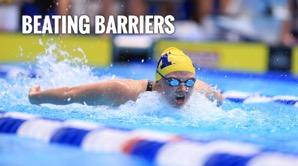Anxiety
Time crunch of balancing work, practice, competition, and classes.
- Coaches do their best to structure practice around classes, but a manageable schedule can quickly turn chaotic as you enter the season of competition.
- For some athletes, being in season creates a structured routine that supports improved academic performance. However, other student athletes find it a challenge to juggle such a rigorous schedule.
- Learn more about time management!
Pressure to perform as the commitment increases.
- As the level of commitment grows, so does the expectation on your performance. Many student athletes admit the pressure to succeed on the collegiate level seriously impacts their focus.
Maintaining your scholarship
- For some athletes, scholarships are the only reason they are able to attend college. Scholarships can be determined by your performance in athletic competition and in the classroom. When competing demands emerge, the anxiety may follow.
More information on anxiety
Effects on Performance
- Concentration/Focus diminished
- Less able to manage natural anxiety in competition
- Lose energy needed to adequately prepare
Depression
The impact of injury
- The injured athlete potentially faces many changes: not feeling a part of the team; losing credibility; falling behind teammates in skills and experience; or the prospect that their season or career may be over.
- These changes may create the challenge of grief that a student athlete is not always prepared to handle.
- Typically, the student athlete's reaction is all about recovery from the physical problem, and rarely addresses the common emotional pain and anxiety that accompanies the injury. When the emotional and mental toll is ignored, full recovery is impeded.
Ending the season or career
- When fewer than 1% of college athletes become professionals in their sports, all student athletes who have dreamed and worked for so long to succeed the adjustment to ending can still come as a shock. What's next? Who am I now?
- For most, their role may simply change, and the sport they love can still have a significant place in their life. Some may coach, and others find ways to integrate sports into their professional or personal lives.
More information on depression
Effects on Performance
- Decrease in motivation, concentration, and/or energy
- Loss of interest in competition and/or teammates
- Burn out, dissatisfaction and/or irritability or anger
- Increased risk of injury
Relationships
Conflicts with teammates
- The student athlete is surrounded by teammates more days than not through the year.
- Many athletes live with their teammates. For some, this could pose a challenge and conflicts may emerge.
- When tension rises within the team, take time away and see if you can gain a fresh perspective.
- Talking and spending time with peers who are not on the team is a great first step.
Relationship with coaches
- Relationships with coaches can also present challenges.
- Student athletes may have concerns about playing time, the need to adjust to a new style of coaching, or personality conflicts, all of which can significantly impact both the relationship with coaches and the mental health of student athletes.
More information on relationships
Effects on Performance
- Team chemisty impacted
- Lack of focus in preparation and competition
- Decreased motivation
8 Ways to Win with Your Head(Adapted from Don Patterson, 2001)
- Understand what you are feeling throughout the competition.
- Build your confidence through repetition and reflection.
- Practice like you play.
- Visualize the adversity...Overcome the adversity.
- Concentrate on one play, one goal...Don't overload yourself.
- When the time comes...Perform, don't think.
- Sidestep the Big Choke...Understand the triggers to your downfall.
- Take time to evaluate yourself and set new goals.

